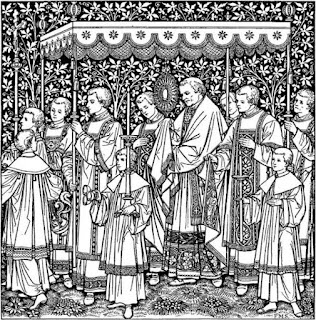In the United States of America, at least, many Catholics are celebrating the Solemnity of Corpus Christi, the Body and Blood of Christ. I hope that we all sing the entire Sequence by St. Thomas Aquinas, hear an excellent homily, and participate in a great outdoor procession, Adoration and Benediction of the Most Holy Blessed Sacrament, singing Aquinas' other great Eucharistic hymns, the Salutoris Hostia and Tantum Ergo. Exposition and Adoration of the Blessed Sacrament is a great traditional devotion of the Catholic Church. The Real Presence, Body, Blood, Soul and Divinity of Jesus in the Blessed Sacrament is the source and summit, the center of our Sacramental life.
Before the Reformation in England, Corpus Christi was a day of great ritual, with processions comparable to Holy Thursday and the performance of the Mystery Plays, which enacted salvation history from Creation to the Second Coming. This Feast was introduced in England during the early 14th century (1318) with the Office by St. Thomas Aquinas, but it gained almost immediate popularity among the English, according to both Eamon Duffy and Miri Rubin. The English expressed their devotion to the Real Presence in the Holy Eucharist with the formation of Corpus Christi Guilds to prepare for the annual celebrations. The cycle of Mystery plays required months of preparation and fundraising for the decorations. Anthony Esolen interprets the Wakefield cycle of plays here. Corpus Christi College in Cambridge was founded by such a guild in 1352.
Adoration and devotion to the Blessed Sacrament was essential to pre-Reformation Catholic spirituality in England. The Corpus Christi was the center of the entire Paschal Mystery of Incarnation, Redemption and Resurrection. For the individual Christian, Christ's Real Presence in Mass and in adoration outside of Mass, symbolized their participation in that Mystery--even though they in the normal course of the liturgical year received Holy Communion rarely.
Of course, this all ended after the English Reformation and was revived among Catholics in England only after Emancipation in 1829 and Restoration of the Hierarchy in 1850. In September of 1908, a great Eucharistic Congress was held in London. The Spectator editorial page commented on the event, raising some concerns:
Since Cardinal Pole had not visited England for 350, who had any living memory of it? What immediate memories were there to recall? What they had was the memory of the hatred of Catholicism.
One jarring note, and one only, has been struck. The solemn closing of the Congress on Sunday afternoon is to be marked by a "Great Procession of the Blessed Sacrament," which is to follow the celebration of Pontifical vespers and to precede the " Te Deum " and "Benediction". The route has been carefully chosen in the quieter streets round Westminster Cathedral, and has received the approval of the police authorities. Unfortunately, however, such a procession "falls within the mischief" of the twenty-sixth section of the Catholic Emancipation Act, which subjects all persons taking part in it to a substantial fine. The Protestant societies are up in arms, are appealing to the Sovereign to forbid it by Proclamation, and are calling upon the Ministry and upon the head of the Metropolitan Police to enforce the statute. The law is the law, and we do not deny that it is on the side of the protest. But the Protestant position is so safe in this country, so deep-rooted in the convictions of the people, that we should deeply regret open unpleasantness in the streets, not only as a discourtesy to our visitors, but as something like a declaration of weakness,—a distrust in our great tradition of toleration. . . .
The Spectator editorial then goes on to comment on the progress that Catholics had made in England since Emancipation in 1829 and indeed the progress English Protestants had made in accepting the progress that Catholics had made. But then, the editors note one problem: the public procession of the Blessed Sacrament:

No comments:
Post a Comment